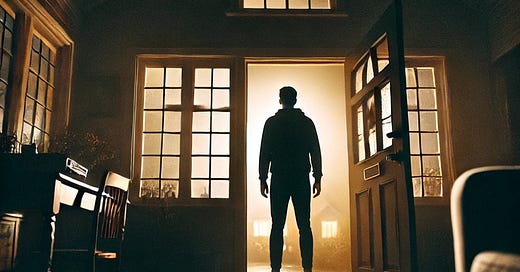Here’s a story to set the stage for today’s post on The Tolton Path:
After weeks of searching, I haven’t found another newspaper in this town. I sit down in another deserted house and flip open the one newspaper I do have for the hundredth time. What is this? It’s a short article I didn’t notice before. It reads:
“I don’t use these words lightly, but I don’t believe what we are being told. Why aren’t we allowed to talk freely? Why aren’t we allowed to visit one another? Why must our diet change? There is but one explanation remaining: we are being deceived. We deserve the truth!”
It’s signed, Yusuf. Same name as mine.
What does deceived mean?
The front door begins to rattle and I feel the house shift as the wind leans into the structure. A bright light comes through the windows.
“Knock, knock.” I turn towards the door. Can it be? Someone else is here! After all these years.
I open the door and find a towering figure surrounded by an orange glare from the full moon. “Hello, Yusuf. It’s nice to meet you. I am Truth.”
–End story (for now)–
Hearing One Another: A Mac & Cheese Hack
My 11 year old daughter enjoys impressing me with her knowledge. She’s ready to be an adult (so she says) and take on more responsibilities. For example she’s declared fit for making her own macaroni and cheese. Of course, all I can think about are the dozens of times I’ve seen her break something and make a mess (she’s an expert). As she begs for me to let her grow up, I interject how she’s going to touch something that’s hot or spill scalding water, etc.
But, alas, a video on YouTube has taught her everything she needs to know. With every possible way to obtain information at the touch of a finger and at the sound of our voice, we can figure out how to do anything. (There’s a mac and cheese “hack” that involves using a spoon with holes—so I’m told—that I’ve forgotten.)
The dominant source of facts, information and ideas used to come from newspapers (created four hundred years ago) and physical books (created over 5,000 years ago). Now information seemingly comes from just about any device and from millions of people who are, in essence, strangers.
My daughter, like most people including myself, tends to outweigh the advice from strangers rather than someone we know in real life. “Strangers” is a bit harsh, so let’s call them influencers. I’m not saying you can’t learn from these influencers and personalities but we have a natural tendency to discount the advice from people we know in real life. An influencer with 100,000 YouTube followers must know more than me.
Let’s go 2,000 years in the past to understand why we tend to outweigh opinions and advice from people outside our “real life.”
In the book of Matthew, Jesus was traveling from city to city, healing and preaching with such great authority, that people were left in amazement, wondering who he was and where he came from. But when Jesus returned to his hometown and did the same thing they said, in essence, who does he think he is? He’s no better than us. To which Jesus replied, “A prophet is not without honor except in his native place and in his own house” (Matthew 13:57 USCCB).
This tells me two things. First, learning from “strangers” can be a good thing. In our modern technological world of information coming through social media and AI, we have an opportunity to share ideas and connect. So there is no need to wait for people to arrive in town, we’re already together. Be curious and ask questions, not to win, but grow and understand a different perspective. But even if you don’t agree with that perspective, at least you know why.
Second, don’t discount what a family member or a friend is telling you just because you know them. They are a stranger to someone else. They may indeed hold a piece of your puzzle that will connect you to an entirely new world that challenges a belief or position.
We are blessings to one another. Let’s sharpen one another and build each other up to form a more solid foundation for all of us to stand upon. So smile and tell your children how tasty their food is as you're standing in a kitchen that looks like a crime scene. Maybe even try the mac and cheese spoon with holes hack.
Peace.




